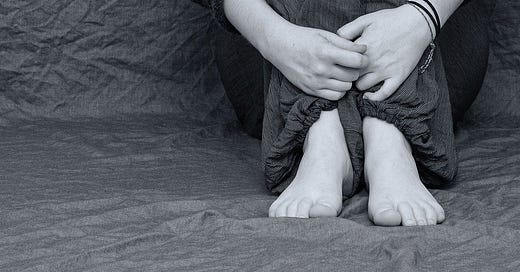Homo socialis 🧑🤝🧑
We are social animals. Even the most introverted among us have to admit this. (It’s a mistake to think that people who are introverted are not social, by the way.) In fact, lacking social interaction is quite detrimental to your health. Loneliness is well-known to be a major risk factor for poor physical and mental health outcomes.
At this point, we need to distinguish between loneliness and being alone. You can be lonely in a crowd and at peace in solitude.
In the words of philosopher Hannah Arendt:
Loneliness is not solitude. Solitude requires being alone whereas loneliness shows itself most sharply in company with others.
Being alone is an objective state, being lonely is a subjective one. A nice definition of loneliness I ran across is this:
…the subjective perception of social isolation, or the discrepancy between one’s desired and perceived levels of social connection.
Anyway, loneliness = bad.
Unfortunately, a lot of surveys indicate that ‘feeling lonely’ is becoming increasingly prevalent, with many estimates hovering around 30-40% of adults in Western countries reporting feeling (at least sometimes) lonely.
Moral of the story: we’ve never been more connected and we’ve never been lonelier.
Why is loneliness so bad for our overall health, though? There can be social reasons. Perhaps people with a lot of friends are more likely to be active, to have support in terms of pursuing a healthy lifestyle, and so on. But the effects of loneliness are too substantial and too consistent for that to play a key role. Chronic stress? Certainly involved and detrimental in many ways. What about the brain? Loneliness correlates with declines in brain health and dementia risk. Is there something going on in the lonely brain?
Homo imaginatus 🧠
This brings me to the research I wanted to use a jump-off point for some thought-wrangling. (Yes, the study is almost 2 years old. Gives you an idea about the size of my to-read pile…)
The reason I find it very interesting is that it suggests that loneliness is hard on the brain because lonely brains are excessively social. Let me explain. The researchers looked at the brains of a bunch of people and tried to find out if there were features more obvious in the brains of people who considered themselves lonely.
Long story short:
Lonely individuals display stronger functional communication in the default network, and greater microstructural integrity of its fornix pathway.
Lonely brains are hard at work.
The researchers hypothesize that this
… fits with the possibility that the up-regulation of these neural circuits supports mentalizing, reminiscence, and imagination to fill the social void.
In other words, perhaps lonely people are more likely to imagine being social and daydream about having a tight-knit crew of kindred spirits. In the case of chronic feelings of loneliness, this might (the keyword as all of this is hypothetical) put the brain in overdrive. Being in overdrive all the time is never a good idea. It might wear you (and your brain) down. Hence the detrimental effects of loneliness on brain health.
At least that’s the story. Anecdotally, it rings true. Lonely kids make up imaginary friends, right? Lonely adults do too, but we’re not supposed to talk about that. That’s the saddest thing about it all. Loneliness is everywhere but we silence it to death. (Or to the lonely people’s death, to be painfully accurate.)
I’d say go out and hug a stranger, but these days that’ll get you some very odd looks.
What do we do about it? I wish I had an answer, but I am, in many ways, the wrong person to ask.
I’m curious to hear what you think. In moments of loneliness (if you have those, it’s okay, we all do) do you find your mind wandering and meandering toward dreams of belonging - whatever for that takes?
This was a bit of a sad newsletter. My first impulse is to apologize for that, but I won’t. Sadness has its place and loneliness, sadly (ha), does too. And that’s okay. Ignoring it won’t make it go away.
I see you.
Virtual hugs! 🤗






Hi Gunnar! I see you, too. Really appreciated the vulnerability of this post and your willingness to talk about something that is often considered a public health crisis. Loneliness has been shown to negatively impact the immune system, upregulate cortisol production, and lead to earlier mortality. Having dealt with chronic illness for over half my life, social isolation has been the norm, but I’m grateful for the opportunity to interact with fellow creators and scientists like you. Makes the world just a tad bit smaller. Thanks for everything you do.
What an interesting piece of science! It's an all too close topic I, and many of us, have to go through more often than expected..